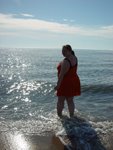I wanted to comment on the water sources in the various cities in this area:
Albany: Fairly soft, acidic water; you will definitely need to add a buffer to keep the pH stable, especially in the winter. Otherwise, pretty good for raising fish as long as you keep an eye on the pH. Tap water is typically about 7.2-7.4, but drops quickly due to the low mineral content. You might want to consider adding a few pieces of base rock (for coral tanks) to a freshwater tank to keep the pH stable long-term.
Schenectady: We get our water from an aquifer, so it's got plenty of minerals. The water is hard, and comes out of the tap with a pH of around 7.8-8.0. I got very spoiled keeping fish here, because the pH stays stable for a long time, even if you're bad about water changes.
Troy: Worse than Albany; the water comes from reservoirs, and it is always very soft and acidic. Comes out of the tap at 7.0, but drops to 6.0 within two days or so, once the carbonates bubble out. If you're going to keep freshwater fish, I strongly recommend use of a buffer AND adding some marine substrate to keep the pH from dropping rapidly.
Clifton Park: Must get it from an aquifer, because it comes out of the tap at about 8.4-8.6. Seriously. So, if you want to keep discus, get a water softener. Most fish can adapt to a higher pH, like in Schenectady, but in CP, you should choose fish that can take an extremely high pH. African cichlids are ideal, as are marine fish.
Latham: Almost perfect; only Schenectady is as good. Hard but only mildly alkaline, Latham water has lots of minerals and starts out at 7.4-7.6. It's fairly stable, and it is adaptable to most fish species.
Most of the other areas get their water from one of the above sources, or I haven't had experience with them. Check your water source before you add fish, and figure out what you need to do to keep your pH stable. There are a lot of rural areas where people have wells, and they seem to run from soft and acidic to extremely hard and alkaline, depending on where you are. If you have a well, have your water tested for ammonia and nitrite content before adding fish; you may need to use a water conditioner like Prime, which neutralizes ammonia and nitrite.
The ammonia and nitrite get into well water via farm animal waste, and if it shows up in your test, you should consider sending your water to be tested for E. coli. In the water chemistry class at Cobleskill, there is at least one person every year whose tap water turns out to be full of ammonia, nitrite, and E. coli, and the person and their family had usually been suffering from gastric complaints for quite a while without knowing why. A filter can be added to remove these, or you may need to purchase bottled water. Better safe than sorry.
Subscribe to:
Post Comments (Atom)



No comments:
Post a Comment